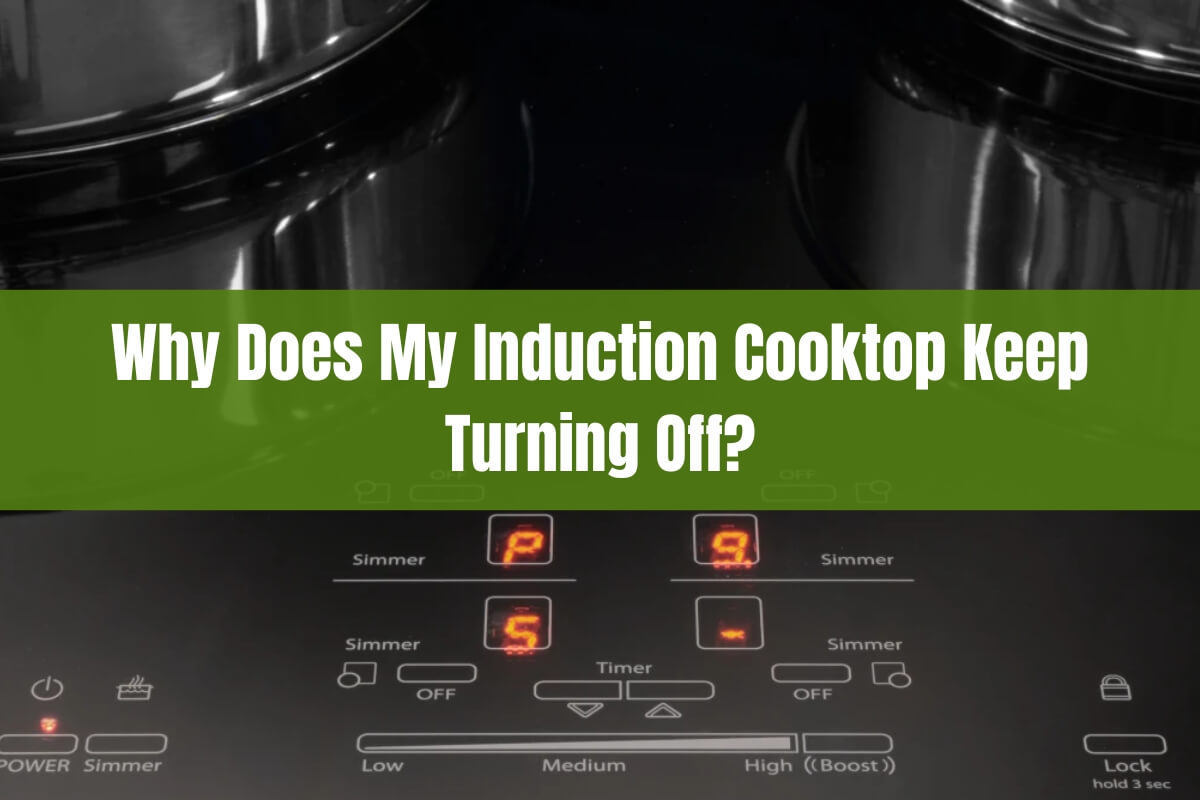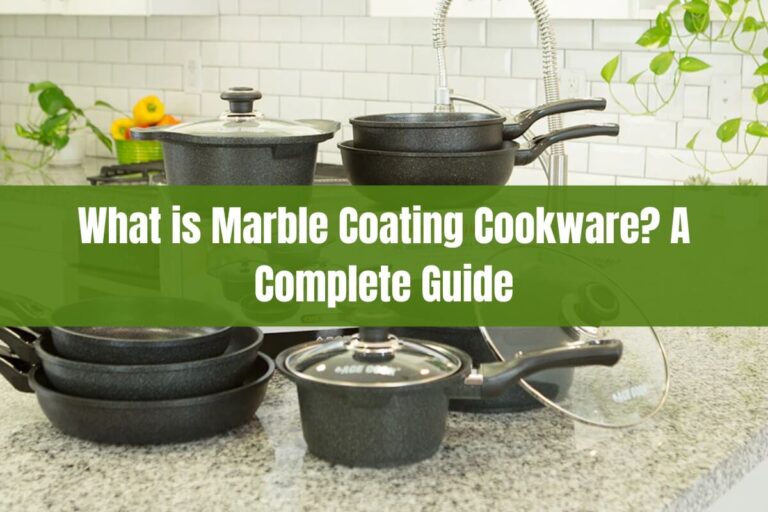
Ah, the joys of modern cooking technology! Induction cooktops have taken the culinary world by storm, offering efficient and precise heating that makes meal preparation a breeze. However, as with any appliance, hiccups can occur, and one of the most frustrating issues is when your induction cooktop keeps turning off unexpectedly. You’re in the middle of sautéing vegetables or simmering a delectable sauce, and suddenly, the cooktop loses power, leaving you scratching your head in bewilderment.
Have you ever found yourself asking, “Why does my induction cooktop keep turning off?” The short answer is there could be several reasons, ranging from built-in safety features to power supply problems or even issues with your cookware.
Don’t worry; in this comprehensive guide, we’ll dive deep into the various causes that could be triggering the unexpected shut-offs and provide practical solutions to help you get your induction cooktop back on track. We’ll cover everything from understanding the safety mechanisms to troubleshooting electrical and cookware compatibility concerns. So, let’s get started and unravel the mystery behind those pesky shut-offs!
Common Safety Features That May Cause Auto Shut-Off
Induction cooktops are designed with several built-in safety features that help prevent accidents and protect the appliance from potential damage. While these features are essential for ensuring safe operation, they can sometimes lead to the cooktop turning off unexpectedly. Here are some common safety features that may cause your induction cooktop to shut off automatically:
Automatic Shut-Off Timer
Most modern induction cooktops come equipped with an automatic shut-off timer, which is a safety feature designed to prevent overheating and potential fire hazards. This timer is programmed to turn off the burner if it’s left on for an extended period without any temperature adjustments.
The specific shut-off time can vary depending on the heat setting and the manufacturer’s specifications. For example, some cooktops may turn off after 60 minutes at the highest heat setting, while others may allow for a longer duration at lower settings.
If you’ve been cooking for an extended period without adjusting the temperature, the automatic shut-off timer may kick in, causing the cooktop to turn off without warning. To avoid this, simply remember to periodically adjust the temperature setting or reset the timer if your cooktop has that functionality.
Overheating Protection
Induction cooktops are designed to generate heat through electromagnetic induction, which means they rely on internal components and sensors to monitor and regulate the temperature. To prevent overheating and potential damage to these internal components, most induction cooktops are equipped with overheating protection mechanisms.
These sensors continuously monitor the internal temperature of the cooktop, and if it gets too hot, they will automatically trigger a shut-off sequence to allow the appliance to cool down. This can happen if you accidentally heat an empty pan or if the cooktop is used for an extended period without proper ventilation.
If your induction cooktop suddenly shuts off and you notice that the surrounding area feels unusually warm, it’s likely that the overheating protection feature has been activated. In this case, it’s best to allow the cooktop to cool down completely before attempting to use it again.
Pan Detection
Another safety feature commonly found in induction cooktops is pan detection. This feature is designed to prevent accidental activation and save energy by ensuring that the cooktop only turns on when a compatible magnetic cookware is placed on the burner.
If the cooktop doesn’t detect a pan on the burner or if the pan being used is not compatible with induction cooking (e.g., made of non-magnetic materials like aluminum or copper), it will automatically shut off to prevent any potential hazards or energy waste.
To avoid this issue, make sure you’re using cookware specifically designed for induction cooking, which typically includes cast iron, magnetic stainless steel, or cookware with a ferromagnetic base. Additionally, ensure that the cookware is properly centered on the burner and not too small or too large for the designated cooking area.
Power and Electrical Issues
While safety features play a crucial role in preventing accidents and protecting your induction cooktop, there are also instances where power and electrical issues can cause unexpected shut-offs. Here are some common power-related problems that may be the culprit behind your cooktop’s erratic behavior:
Circuit Breaker Tripped
Your induction cooktop, like any other electrical appliance, relies on a stable and consistent power supply to function correctly. If the circuit breaker supplying power to your cooktop has tripped, it can cause the cooktop to shut off unexpectedly, leaving you in the middle of your cooking endeavors.
Circuit breakers are designed to trip when there is an electrical overload or a short circuit, preventing potential damage to your home’s wiring and appliances. If you suspect that a tripped circuit breaker is the cause of your cooktop’s shut-off, head to your electrical panel and check the breaker corresponding to your cooktop’s circuit. If it’s in the “off” position, simply reset it by flipping it back to the “on” position.
It’s worth noting that if the circuit breaker continues to trip frequently, there may be an underlying electrical issue that requires further investigation by a qualified electrician.
Loose or Faulty Wiring
Another potential power-related issue that can cause your induction cooktop to shut off unexpectedly is loose or faulty wiring connections. Over time, wiring can become loose or damaged, disrupting the power supply to your cooktop and causing it to lose power.
If you suspect that loose or faulty wiring might be the culprit, it’s best to have a professional electrician inspect the wiring connections and make any necessary repairs. Attempting to fix wiring issues on your own can be dangerous and may even violate local electrical codes.
Power Surge or Voltage Fluctuation
Sudden changes in voltage or power surges can also trigger your induction cooktop to shut off as a protective measure. These fluctuations can occur due to various reasons, such as lightning strikes, issues with the power grid, or the simultaneous operation of multiple high-powered appliances in your home.
While induction cooktops are designed to withstand minor voltage fluctuations, significant surges or drops in voltage can potentially damage the internal components of the appliance. To protect against this, you may want to consider installing a voltage regulator or surge protector for your cooktop, which can help stabilize the power supply and prevent unexpected shut-offs.
Cookware Compatibility and Placement
One of the unique features of induction cooktops is their reliance on magnetic fields to generate heat. As a result, the type of cookware you use and its placement on the burner can significantly impact the cooktop’s performance and may even cause it to shut off unexpectedly. Let’s explore some common issues related to cookware compatibility and placement:
Non-Magnetic Cookware
Induction cooktops require cookware made of ferromagnetic materials, such as cast iron or magnetic stainless steel, to function properly. If you’re using non-magnetic cookware, like aluminum or copper pots and pans, the cooktop won’t be able to generate the necessary electromagnetic field to heat the cookware, and it will simply shut off.
To avoid this issue, it’s crucial to use cookware specifically designed for induction cooking. You can quickly test if your cookware is compatible by using a simple magnet test: if the magnet strongly adheres to the bottom of the pot or pan, it’s likely suitable for induction cooking.
Improper Cookware Placement
Even if you’re using compatible cookware, improper placement on the burner can still cause your induction cooktop to shut off unexpectedly. Induction cooktops rely on precise cookware placement to ensure optimal heat transfer and energy efficiency.
If your cookware is not centered correctly on the burner or if it’s too small or too large for the designated cooking area, the cooktop may not be able to detect it properly, leading to a shut-off.
To prevent this issue, always ensure that your cookware is the appropriate size for the burner you’re using and that it’s properly centered. Most induction cooktops have visual guides or markings on the cooking surface to help you position your cookware correctly.
Maintenance and Troubleshooting
Even with proper usage and compatible cookware, induction cooktops can still experience issues that may lead to unexpected shut-offs. In some cases, regular maintenance and troubleshooting can help resolve these problems and keep your cooktop running smoothly.
Ventilation Issues
Proper ventilation is crucial for induction cooktops to prevent overheating and ensure optimal performance. If your cooktop’s ventilation system is obstructed or not functioning correctly, it can lead to excessive heat buildup, triggering the overheating protection feature and causing the cooktop to shut off.
To avoid this issue, make sure that your cooktop’s ventilation system is clean and unobstructed. Check for any blockages or debris that may be preventing proper airflow, and clean the vents regularly according to the manufacturer’s instructions. If your cooktop doesn’t have adequate ventilation, consider installing additional venting or a range hood to improve airflow and prevent overheating issues.
Sensor Malfunction
Induction cooktops rely on various sensors to monitor temperature, detect cookware, and regulate the overall functioning of the appliance. If any of these sensors malfunction, it can cause the cooktop to behave erratically, including shutting off unexpectedly.
In cases where a sensor malfunction is suspected, it’s best to have a qualified appliance repair technician inspect and diagnose the issue. They have the necessary tools and expertise to identify the faulty sensor and replace it if needed.
Software or Control Board Issues
Like any electronic appliance, induction cooktops are controlled by software and electronic control boards. While these components are designed to be reliable, they can sometimes experience glitches or failures that may lead to unexpected shut-offs or other malfunctions.
If you’ve ruled out other potential causes and suspect a software or control board issue, it’s recommended to contact the manufacturer or an authorized repair service. They can diagnose the problem and, if necessary, perform a software update or replace the faulty control board.
Regular Cleaning and Maintenance
Proper cleaning and maintenance can go a long way in preventing issues with your induction cooktop and ensuring its longevity. Regularly wiping down the cooktop surface and keeping it free of debris can prevent potential blockages or interference with the sensors.
Additionally, following the manufacturer’s recommended maintenance schedule, such as descaling or cleaning the internal components, can help prevent buildup or corrosion that could lead to malfunctions or shut-offs.
Additional Tips and Advice
If you’ve tried all the troubleshooting steps mentioned above and your induction cooktop still keeps turning off unexpectedly, there are a few additional tips and pieces of advice that may help you resolve the issue:
- Consult the User Manual: Always refer to the user manual for your specific induction cooktop model. Manufacturers often include troubleshooting guides or error codes that can help you identify and address the issue more effectively.
- Perform a Reset: Sometimes, a simple reset can resolve minor software or electrical glitches. Unplug your induction cooktop from the power source for a few minutes, then plug it back in and attempt to use it again.
- Contact the Manufacturer or a Professional: If you’ve exhausted all troubleshooting options and the issue persists, it’s best to contact the manufacturer’s customer support or seek assistance from a qualified appliance repair technician. They can provide expert guidance, diagnose the root cause, and recommend the appropriate repair or replacement if needed.
Remember, attempting to repair an induction cooktop on your own, especially when it involves electrical components, can be dangerous and may void your warranty. It’s always better to err on the side of caution and seek professional assistance when dealing with complex appliance issues.
Conclusion
Induction cooktops are a marvel of modern cooking technology, offering efficiency, precision, and convenience. However, like any appliance, they can experience issues that lead to unexpected shut-offs. By understanding the common causes, such as built-in safety features, power and electrical problems, cookware compatibility issues, and maintenance requirements, you’ll be better equipped to troubleshoot and resolve these problems effectively.
Whether it’s adjusting your cooking habits, addressing ventilation concerns, or seeking professional assistance, taking the appropriate steps can help ensure that your induction cooktop remains a reliable and valuable addition to your kitchen. Remember, prevention is always better than cure, so make sure to follow the manufacturer’s guidelines for proper usage, cleaning, and maintenance to minimize the likelihood of issues arising.
With this comprehensive guide, you now have the knowledge and tools to tackle those frustrating shut-offs, ensuring that your culinary adventures on your induction cooktop are uninterrupted and enjoyable.
Happy cooking!






